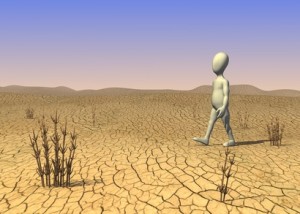Resiliency: The Oasis in the Leadership Desert
by lind7496 • July 1, 2012 • leadership • 0 Comments
Who among us hasn’t come to that Leadership Desert? What leader hasn’t found themselves in a lonely place of isolation and desolation working on problems with no clear resolution; or facing that proverbial “no-win scenario” in a hostile environment of uncertainty?
I once had two jobs from “H-E-double toothpicks” – one a senior executive in the public sector and the other a laboratory assistant. Both were awful. They both stunk and at any given time, I could open up something that was deadly. But I had more hope and resilience as a teenager facing E. Coli than an executive facing Information Technology infrastructure consolidation. Why was that?
How can we find focus and learn our meaning and purpose during difficult times?
Martin Luther King, Jr., sharpened his focus and vision for civil rights in a lonely cell, imprisoned behind parallel bars of metal. In 1963, he penned his famous “Letter from a Birmingham Jail” as a reaction to criticism that the civil-rights battle should be fought solely in courtrooms. In his cell, he developed his message and a plan for implementing non-violent protests and civil disobedience:
. . . when you are harried by day and haunted by night by the fact that you are a Negro, living constantly at tiptoe stance, never quite knowing what to expect next, and are plagued with inner fears and outer resentments; when you go forever fighting a degenerating sense of “nobodies” then you will understand why we find it difficult to wait. There comes a time when the cup of endurance runs over, and men are no longer willing to be plunged into the abyss of despair.
It was from prison – that desert of loneliness, silence, and personal suffering – that King poured from his heart a call to action that would help end the loneliness of segregation, the silence of injustice, and the suffering endured by people of color everywhere.
How is your faith strengthened in adversity?
One of my favorite movie scenes is in Indiana Jones and the Last Crusade. Our hero, Indiana Jones, must pass three tests before he can recover the Holy Grail, one of which requires him to “step out on faith.” In this test, he must cross a deep, wide cavern with no visible means of doing so. He takes a deep breath and makes the first step into thin air. Suddenly, he realizes that there is a bridge; it just matches the texture and color of the cavern so that it appears invisible. The test, which he passes, is to realize that it is possible to obtain his goal without any visible means to do so, to walk across a bottomless abyss to make the dream of his career come true. As he closes his eyes and takes a deep breath, he goes against everything he has learned in his academic career. Jones understands physics and gravity and the doom that lies at the base of this chasm, but he makes the first crazy step of faith that puts him on the path to his destiny. Each step is inspired by the dream of the Holy Grail as he makes his “impossible” walk to destiny.
How do struggles make us stronger?
“What man actually needs is not a tensionless state but rather the striving and struggling for some goal worthy of him. What he needs is not the discharge of tension at any cost, but the call of a potential meaning waiting to be fulfilled by him.” – Vicktor Frankl, author of Man’s Search for Meaning
Vicktor Frankl, a holocaust survivor, speaks to the tension we need to become who we are meant to be. Vicktor Frankl, in Man’s Search for Meaning, writes that enduring and surviving suffering helps us ultimately find purpose and meaning in life. Like King in his the Birmingham cell, Frankl began conceptualizing his book amid suffering, despair, and hopelessness as a prisoner in a Nazi concentration camp. King and Frankl have a valuable lesson for all of us, whether we endeavor to lead or just survive: Survival during suffering is really only possible when one becomes dedicated to a cause greater than himself. Holocaust prisoners lost everything – their possessions, degrees, businesses, and loved ones. The only thing left for them to hold onto was the meaning and purpose they could find in their lives. The misery evident on the surface did not diminish the beauty which lied underneath.
The Leadership Oasis
As a teenager imprisoned in an infectious diseases lab, I knew what I wanted – to get in college – the first in my family – and finish – and I knew I could do it. I had the youthful confidence that I could do it. And more than anything, I was so grateful to have a job, even though it stunk. Faith. Purpose. Confidence. Endurance. I really wish I hadn’t forgotten those things as an executive leading a death march IT project. Maybe I didn’t have to dig as deep to find what I needed as a teenaager. The resilience lesson for me now is to keep digging deeper. And even deeper.
The next time you are in a desert or prison in your own life or career, when you look around at your scarce resources, dig deep and choose instead to see life, and life abundant, because you are in the perfect place to find faith, stamina, courage, and an oasis of purpose and meaning.

